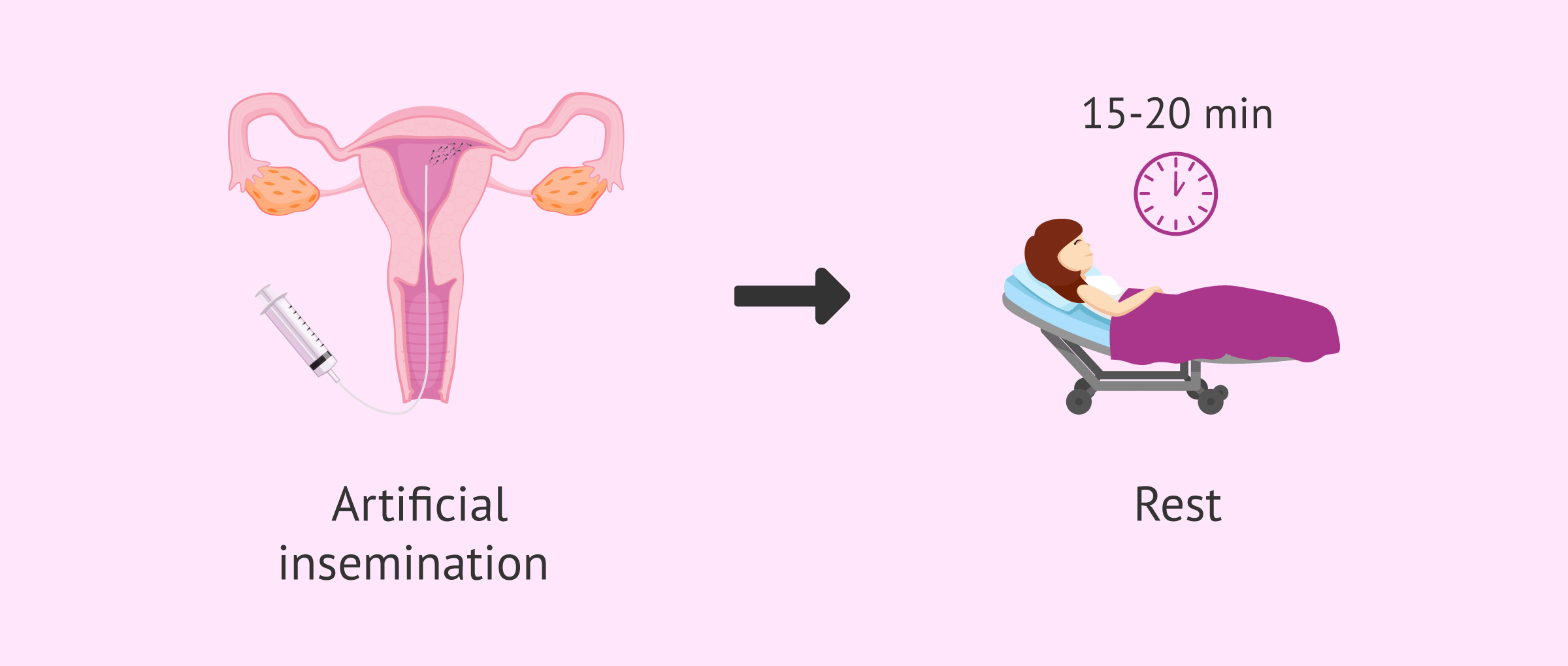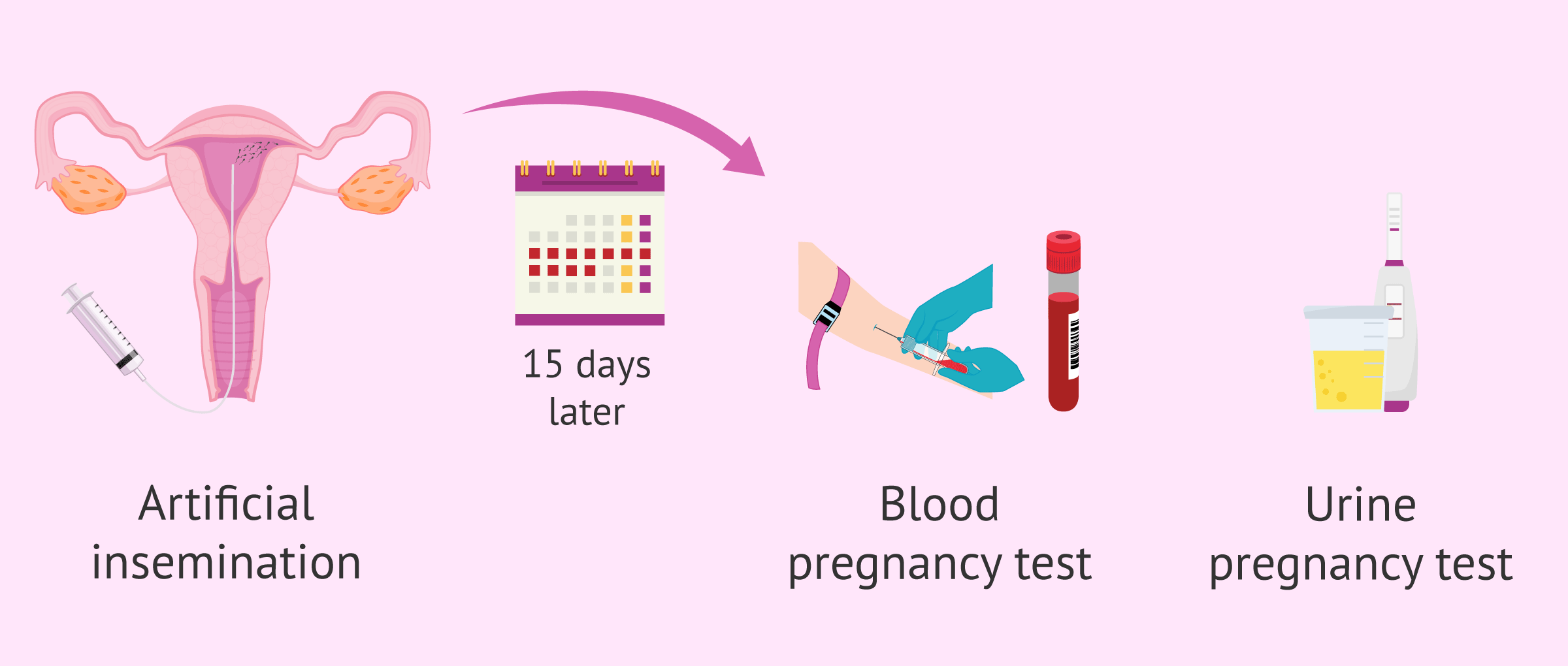After undergoing an Artificial Insemination (AI) cycle, whether it is Artificial Insemination by Husband (AIH) or Artificial Insemination by Donor (AID), patients must wait for at least 15 days approximately before taking a pregnancy test to confirm if the AI cycle has been successful or not.
These 15-day period is known as 2WW, which is the abbreviation of Two-Week Wait. During this time period, the woman can continue with her normal routine, except in certain exceptional cases where the doctor indicates bed rest. Moreover, it is possible that you feel a series of symptoms associated with hormone medications, which can be confused by pregnancy symptoms.
Provided below is an index with the 7 points we are going to expand on in this article.
- 1.
- 2.
- 2.1.
- 2.2.
- 3.
- 4.
- 4.1.
- 4.2.
- 4.3.
- 4.4.
- 4.5.
- 4.6.
- 5.
- 6.
- 7.
Rest following AI
El tratamiento de inseminación artificial termina con la introducción del semen capacitado en el interior del útero de la mujer con la ayuda de una cánula flexible. La fecundación entre el óvulo y el espermatozoide tendrá lugar de forma natural unas horas o días después.
Este procedimiento se lleva a cabo en la consulta del ginecólogo y no es necesario entrar a quirófano, ya que es muy sencillo y casi indoloro.
Una vez hecha la inseminación, se recomienda que la mujer repose de 15 a 25 minutos en la camilla o habitación de recuperación si es el caso para su mayor comidad y tranquilidad.
No obstante, no es necesario mantener reposo tras una inseminación artificial ni tampoco aumenta la probabilidad de éxito, a no ser que el ginecólogo lo indique por algún motivo especial.
After the woman or partner has left the clinic, she can go on with her normal life: go to work, drive, do leisure activities such as walking, going to the movies, etc. In addition, if the patient is distracted, it will help to avoid having thoughts about the success or failure of the AI.
How long is the waiting time after AI?
Right after intrauterine insemination, a period that is commonly known as two-week wait (2WW) starts. When it finishes, it will be time for you to take a pregnancy test.
The 2WW following IUI has an approximate duration of 15 days. During this period, having feelings of uncertainty is normal. Moreover, it is likely that you feel some of the side effects of hormone medications.
Symptoms after IUI
It is common for women to receive, from the moment of insemination on, hormone medications with progesterone in order to keep the endometrial lining in optimal conditions to receive the embryo and favor its implantation.
Progesterone administration during the two-week wait, along with the use of other fertility drugs during ovarian stimulation, can cause some side effects of variable severity in the patient.
The following is a list of the most common symptoms to expect following IUI:
- Abdominal bloating
- Abdominal pain
- Cramping (pelvic pain) due to the passage of the cannula
- Brown spotting
- Frequent urge to pee
- Swollen and tender breasts
- Watery or yellowish vaginal discharge
- Fatigue
Women usually confuse these side effects of fertility drugs for pregnancy symptoms, which is a mistake. These discomforts are common after IUI cycles and can appear regardless of whether the outcome of the treatment is a negative or positive one.
When to take a pregnancy test?
The pregnancy test, either in urine or blood, will be carried out when indicated by the gynecologist. The most usual thing is to wait about 15 days after the AI, enough time for the beta-hCG hormone to be synthesized and for it to be detected by the pregnancy test.
If you take the pregnancy test too soon, there is a risk of getting a false negative because the hormone cannot yet be detected. In the same way, a false positive could also be obtained if the test is done too soon since it would be detecting the hCG hormone used in AI to induce ovulation.
As for the way of doing the test, whether in blood or urine, both ways are reliable if they are done at the right time. However, it is always more advisable to do the quantitative blood test after an assisted reproduction treatment.
In case of a negative test result, the woman is expected to have vaginal bleeding corresponding to menstruation in the next few days. During this beginning of the cycle, the woman can carry out a new attempt, since artificial inseminations can be performed consecutively.
To learn more about the recommended time for you to get an accurate result after taking a pregnancy test, read: When to Do a Pregnancy Test? – How to Use, Results & Accuracy.
Recommendations after AI
Generally, it is recommended that you continue with your normal lifestyle after undergoing an IUI cycle unless your job runs a great level of risk or is a too demanding position. In these cases, your doctor may indicate that you take some time off work.
Aside from this, the following are some tips that may be helpful for women after being artificially inseminated:
- Have sexual intercourse before 8-12 hours after IUI, since uterine contractions will help sperm ascend through your reproductive tract.
- Avoid great physical efforts like carrying too much weight or too vigorous sports. In the latter case, you can replace these activities for moderate exercise.
- Do not become obsessed with potential symptoms or try to associated them with pregnancy.
- Try to forget about the final outcome. You should stay positive above all, but at the same time get mentally prepared for a potential negative result.
- Stay busy: it will help to reduce stress levels associated to treatment. We recommend that you schedule different activities for the 2WW.
- Ask your doctor in case your symptoms become too painful or you have a heavy vaginal bleeding before your expected period due date.
- Share your feelings with your partner and try to support each other.
Therefore, there is no special treatment or care to be taken when a woman undergoes artificial insemination. It is simply advisable to follow the recommendations established by the specialist, eat a healthy diet, and drink plenty of fluids.
FAQs from users
How long does artificial insemination last and how long should I stay in the clinic afterwards?
The duration of artificial insemination is usually about 5 minutes if there is no problem. After the process, the patient will rest for 20-30 minutes and then leave the clinic with the instructions until the day of the pregnancy test.
Rest after insemination is not obligatory, as no evidence exists that it improves the pregnancy rate.
Read more
Can I take medication after AI?
The medication that can be taken after artificial insemination is the same as someone seeking pregnancy.
After an insemination it is usually recommended to use progesterone and continue taking folic acid or a multivitamin.
If you are taking a medication and are seeking pregnancy you should consult with your doctor to find out if this drug is appropriate during pregnancy and the months prior to pregnancy.
Is bed rest necessary after intrauterine insemination?
After intrauterine insemination, your doctor may recommend that you stay in bed for a few minutes in order to favor the journey of sperm inside your reproductive tract and for you to recover from the procedure as well. However, several studies have confirmed that rest following IUI does not increase chances of success.
Once you return home, you can continue with your normal routines and lifestyle, always avoiding great efforts and heavy weight lifting.
Is bleeding normal after intrauterine insemination?
No, it is not. However, you might experience a mild spotting or bleeding as a side effect of the insemination itself, due to the passage of the cannula through the cervix.
On the other hand, if you have a heavy bleeding several days after IUI, it is likely that it is menstrual flow. In that case, it would mean that the treatment has failed.
Does intrauterine insemination hurt?
Not in principle. This is the reason why the procedure is carried out without anesthesia. On the other hand, it is likely that the patient has mild discomfort or symptoms like cramping or abdominal pain following the insemination.
In any case, and as long as it is not an intense pain, it should not be an alarming symptom. In the few cases where pain is unbearable, we recommend that you visit your doctor.
What are the symptoms of pregnancy after a positive IUI result?
Pregnancy symptoms vary greatly from woman to woman. While some start noticing the first pregnancy symptoms right after the procedure, others do not have any symptom for the moment.
In any case, having symptoms of pregnancy earlier than 15 days after IUI is uncommon, except for implantation bleeding.
Check out this for information: What Are the Most Common Symptoms of Pregnancy?
Recommended readings
The two-week wait is a necessary period after all types of fertility treatments. It is another phase required before finding out whether it has worked or not. If you find yourself in this stage, we recommend that you continue with this reading to get more info: What is the Two-Week Wait (2WW)? – Tips to Survive It.
Also, if you wish to learn more about normal hCG levels during pregnancy and how to calculate the weeks of pregnancy, we recommend that you have a look at this: What Are Normal hCG Hormone Levels during Pregnancy?
We make a great effort to provide you with the highest quality information.
🙏 Please share this article if you liked it. 💜💜 You help us continue!
References
Karlstrom P-O, Bergh T, Lundkvist O. A prospective randomized trial of artificial insemination versus intercourse in cycles stimulated with human menopausal gonadotropin or clomiphene citrate. Fertil Steril 1993:59;554–9.
Khan JA, Sunde A, Von During V, Sordal T, Molne K. Intrauterine insemination. Ann NY Acad Sci 1991;626:452–60.
Plosker SM, Jacobson W, Amato P. Predicting and optimizing success in an intrauterine insemination programme. Hum Reprod 1994;9:2014–21.
Rubenstein BB, Strauss H, Lazarus ML, Hankin H. Sperm survival in women. Fertil Steril 1951;2:15–9.
Sharif K, Afnan M, Lashen H, Elgend M, Morgan C, Sinclair L. Is bed rest following embryo transfer necessary? Fertil Steril 1998;69:478– 81.
Tomlinson MJ, Amissah-Arthur JB, Thompson KA, Kasraie JL, Bentick B. Prognostic indicators for intrauterine insemination (IUI): statistical model for IUI success. Hum Reprod 1996;11:1892–6.
World Health Organization. Laboratory manual for the examination of human sperm and sperm-cervical mucus interaction. 3rd ed. New York: Cambridge University Press, 1992:43–4.
FAQs from users: 'How long does artificial insemination last and how long should I stay in the clinic afterwards?', 'Can I take medication after AI?', 'Is bed rest necessary after intrauterine insemination?', 'Is bleeding normal after intrauterine insemination?', 'Does intrauterine insemination hurt?' and 'What are the symptoms of pregnancy after a positive IUI result?'.
Authors and contributors
More information about Cristina Algarra Goosman









Hi, I am having an AI in a few days. I am nervous about what I might do next that will make conception and transfer difficult. Is there anything I can do to increase the odds? I don’t know rest or something.
Hello Carolina,
After an IA it is recommended to lead as normal a life as possible. In the clinic after insemination, it is recommended to rest for 15-20 minutes.
After this time the patient can continue with her life. It is true that it is recommended not to make great efforts.
I hope everything goes well!